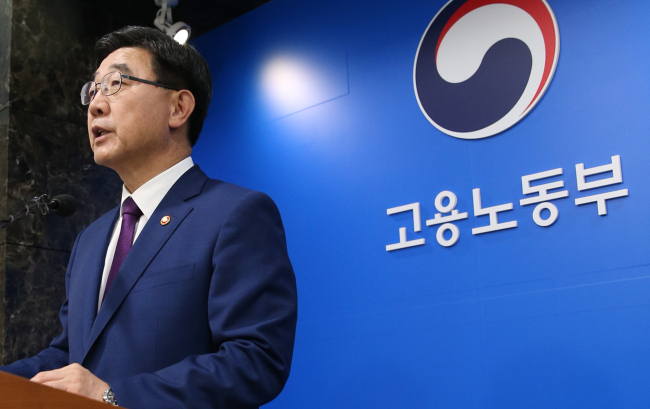With the launch of the 20th National Assembly on Monday, the labor minister has renewed calls for the swift passage of bills to boost the sluggish economy and create jobs.
The ruling Saenuri Party was set to resubmit four labor market reform bills aimed to improve labor conditions and provide more flexibility to the market. The bills failed to pass the 19th National Assembly amid objection from labor unions and the opposition bloc.
Employment and Labor Minister Lee Ki-kweon underscored the need for labor market reforms at a press briefing held in the afternoon, calling the structural market revamp an “unavoidable and historic task” for the next generation to survive.
“The package of the labor market reform bills urgently need to be passed to provide job opportunities for the young and elderly,” Lee said. “The bills are also to expand unemployment benefits to help the jobless who lost their employment due to restructuring get a job again.”
The ruling Saenuri Party was set to resubmit four labor market reform bills aimed to improve labor conditions and provide more flexibility to the market. The bills failed to pass the 19th National Assembly amid objection from labor unions and the opposition bloc.
Employment and Labor Minister Lee Ki-kweon underscored the need for labor market reforms at a press briefing held in the afternoon, calling the structural market revamp an “unavoidable and historic task” for the next generation to survive.
“The package of the labor market reform bills urgently need to be passed to provide job opportunities for the young and elderly,” Lee said. “The bills are also to expand unemployment benefits to help the jobless who lost their employment due to restructuring get a job again.”

The proposed bills stipulate an improvement in benefits for the unemployed, reduction of working hours and expansion of sectors in which employers can hire temporary workers. It left out a contentious bill to extend the hiring of irregular workers, mindful of the fierce resistance from the nation’s labor unions.
The prospects for the passage of the reform bills, however, remain bleak, as the ruling Saenuri Party lost its majority in the National Assembly and opposition parties pledged to block the “unilateral” reform drive.
The opposition bloc and the nation’s trade unions have relentlessly resisted the bills that will expand sectors in which irregular workers can be dispatched through subcontractors.
While the government views it as paving the way for companies to create new jobs, labor unions see it as undermining job security and giving leeway for employers to hire nonregular workers.
The labor minister pointed to the nation’s chronic market duality, citing the Organization for Economic Cooperation and Development’s recent report on the Korean economy. The OECD said that low mobility from nonregular to regular jobs and wage gaps between small and large-sized enterprises are major challenges facing the nation’s economy.
“The widening disparity, which stems from seniority-based wage system and market uncertainties, leads companies to rely more on hiring irregular workers,” the minister said. “If the wage gap between regular and nonregular workers increases, it will erode our growth potential.”
According to government data, there were 6.27 million workers with irregular status last year, accounting for 32.5 percent of the entire labor force in the country. Regular workers at small and medium-sized companies earned 49.7 percent of regular workers’ average income in 2015, while irregular workers only took home 35 percent.
Citing the election schedule to select the 20th National Assembly as a reason behind the failure to pass the “urgent” bills, the minister vowed to have sufficient dialogue on the efficacy of the labor market reforms with the public and lawmakers.
By Ock Hyun-ju (laeticia.ock@heraldcorp.com)
The prospects for the passage of the reform bills, however, remain bleak, as the ruling Saenuri Party lost its majority in the National Assembly and opposition parties pledged to block the “unilateral” reform drive.
The opposition bloc and the nation’s trade unions have relentlessly resisted the bills that will expand sectors in which irregular workers can be dispatched through subcontractors.
While the government views it as paving the way for companies to create new jobs, labor unions see it as undermining job security and giving leeway for employers to hire nonregular workers.
The labor minister pointed to the nation’s chronic market duality, citing the Organization for Economic Cooperation and Development’s recent report on the Korean economy. The OECD said that low mobility from nonregular to regular jobs and wage gaps between small and large-sized enterprises are major challenges facing the nation’s economy.
“The widening disparity, which stems from seniority-based wage system and market uncertainties, leads companies to rely more on hiring irregular workers,” the minister said. “If the wage gap between regular and nonregular workers increases, it will erode our growth potential.”
According to government data, there were 6.27 million workers with irregular status last year, accounting for 32.5 percent of the entire labor force in the country. Regular workers at small and medium-sized companies earned 49.7 percent of regular workers’ average income in 2015, while irregular workers only took home 35 percent.
Citing the election schedule to select the 20th National Assembly as a reason behind the failure to pass the “urgent” bills, the minister vowed to have sufficient dialogue on the efficacy of the labor market reforms with the public and lawmakers.
By Ock Hyun-ju (laeticia.ock@heraldcorp.com)
-
Articles by Ock Hyun-ju









![[Today’s K-pop] BTS pop-up event to come to Seoul](http://res.heraldm.com/phpwas/restmb_idxmake.php?idx=644&simg=/content/image/2024/04/17/20240417050734_0.jpg&u=)

![[Graphic News] More Koreans say they plan long-distance trips this year](http://res.heraldm.com/phpwas/restmb_idxmake.php?idx=644&simg=/content/image/2024/04/17/20240417050828_0.gif&u=)






![[KH Explains] Hyundai's full hybrid edge to pay off amid slow transition to pure EVs](http://res.heraldm.com/phpwas/restmb_idxmake.php?idx=652&simg=/content/image/2024/04/18/20240418050645_0.jpg&u=20240419100350)

